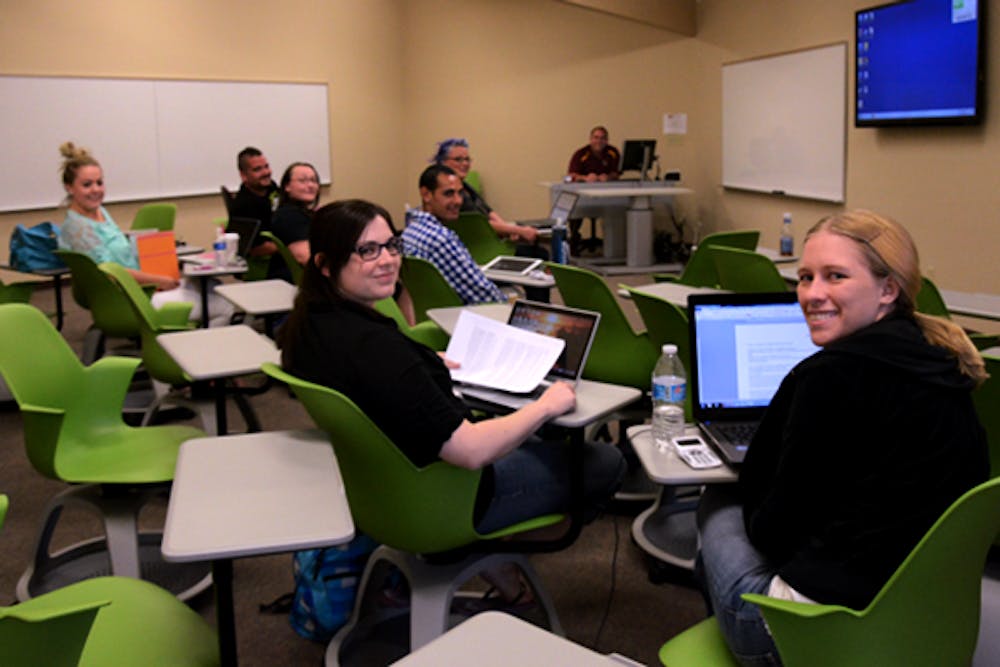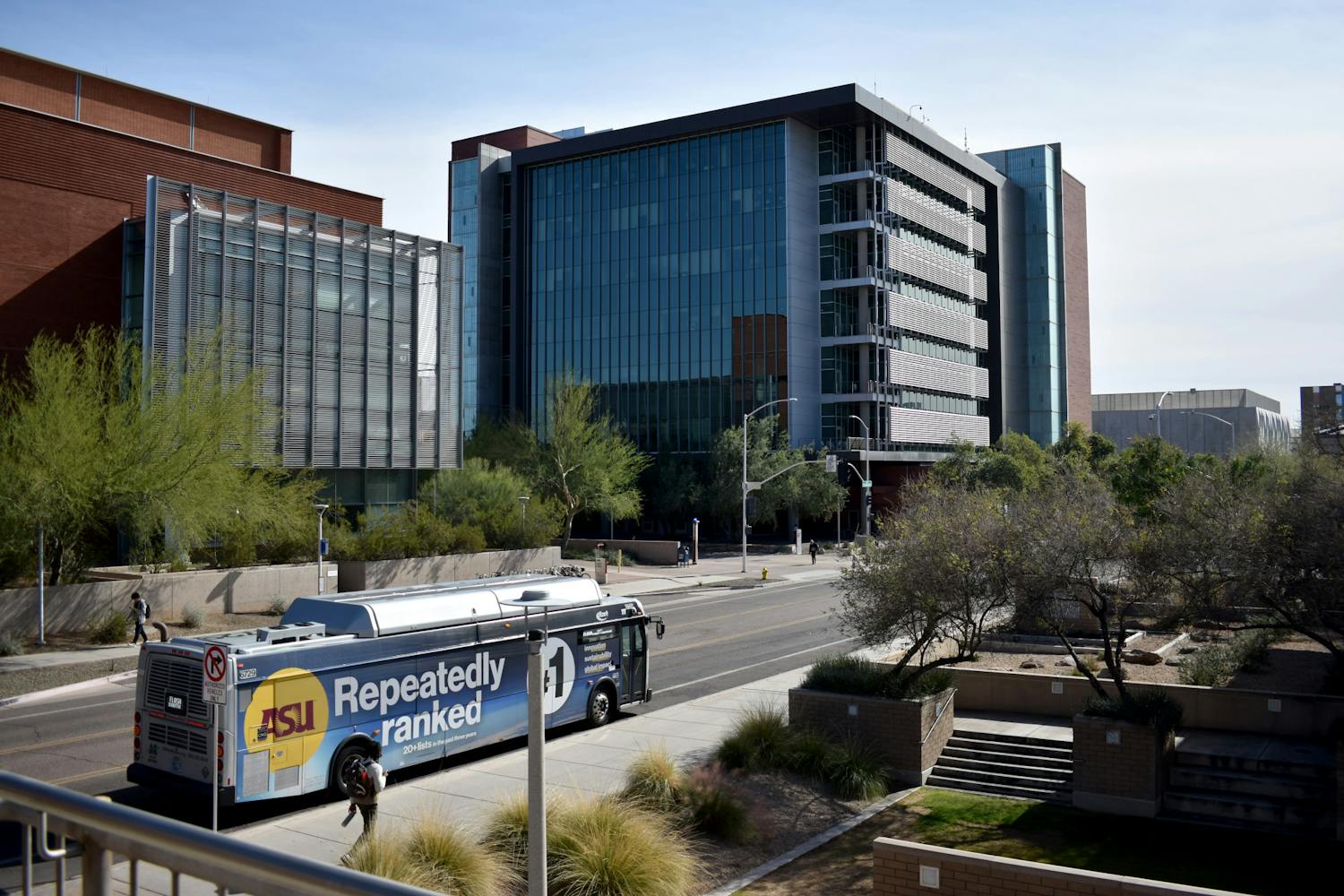 Lake Havasu is the newest ASU campus, which opened in fall 2012. (Photo by Rachel Nemeh)
Lake Havasu is the newest ASU campus, which opened in fall 2012. (Photo by Rachel Nemeh)
Lake Havasu City is a spring break destination for college students across the country, but even after spring break ends, a group of 120 ASU students call Lake Havasu home.
The small campus that opened in fall 2012 is in the center of the small community's downtown and overlooks the crystal blue water of the lake.
The ASU Colleges at Lake Havasu City was a perfect fit for life sciences junior Tom Bullock. He is originally from California, and the easy atmosphere of the city, class sizes and intimate campus were what he was looking for in a university.
"(Life in Lake Havasu City) is easy. It's a small town with nice weather," Bullock said. "When you go to class you can actually have a great view."
 This class of psychology majors created a close-knit, welcoming and comedic classroom environment to study research methods. (Photo by Rachel Nemeh)
This class of psychology majors created a close-knit, welcoming and comedic classroom environment to study research methods. (Photo by Rachel Nemeh)
History of Havasu
The Lake Havasu campus is the product of a huge community effort that started in 2004, when the community founded the Havasu Foundation for Higher Education.
The community was really committed to getting a university campus into its town and had tried to work with NAU in 2008, HFHE President Nancy Iannone said.
In early 2012, the partnership with ASU was announced and work commenced on renovating an unused middle school that was a perfect location for the campus. The community raised $2 million through fundraisers and donations to help pay for the campus, Iannone said.
"At that point when ASU said we need to come to an agreement about what we are each going to put in to this, this was a community-wide effort," she said.
Now that the campus has been operating for about three semesters, she said the community hopes the students and the campus will become a major part of the town through internships, projects, educational offerings and cultural opportunities.
While the real benefits and effects of the Havasu campus cannot truly be seen because the first class graduates this year, Iannone said she hopes graduates will stay in the area for the long-term.
"It's one of the best things we could have done for our community," she said. "It says we as a community want to continue to grow and evolve, and we are willing to invest in our community to make it the best it possibly can be."
 Life Sciences majors, juniors, (left) Tom Bullock and Shelby Verhyen take advantage of Havasu's phenomenal cool weather by socializing in-between classes with, organization leadership major, Kennan Espy (right), on the student center's patio. (Photo by Rachel Nemeh)
Life Sciences majors, juniors, (left) Tom Bullock and Shelby Verhyen take advantage of Havasu's phenomenal cool weather by socializing in-between classes with, organization leadership major, Kennan Espy (right), on the student center's patio. (Photo by Rachel Nemeh)
Small campus model
Lake Havasu offers all the coursework for 10 undergraduate major programs that are very popular on the other campuses. These majors include communication, life science, psychology, sociology and political sciences.
All the coursework for these 10 programs is located entirely in Lake Havasu and is taught by 12 doctorate-level professors that live in Lake Havasu.
Right now there are only about 120 students enrolled at the Lake Havasu campus, but the plans are to grow the campus to have around 2,000 students, Admissions Advising Counselor Laura Shuffler said.
The Lake Havasu campus provides a lot of personalized attention and one-on-one interaction with professors, which can be very helpful for students.
Business communication freshman Tyler Weldon, who is from Bullhead City, said she wanted to go to ASU but chose Lake Havasu for the individual help she could get.
"We get the help we need and they do it quickly to help you soon," Weldon said. "There is a lot of individual attention. They want you to succeed."
The campus has a very small-town atmosphere, and everyone, students and staff, know each other and are dedicated to each other's success.
"There are a lot of things we can offer, but they are still getting a great ASU education, just at a smaller location and a reduced cost," Shuffler said.
The base tuition and fees at Lake Havasu that have been proposed for the next school year are about $6,418 for Arizona residents and $9,508 for non-residents. This is significantly cheaper than the $10,002 residents and $23,654 nonresidents at campuses in the Phoenix area would pay.
Lake Havasu is about a three-hour drive from Phoenix, so some resources are harder for students to get. However, the campus has video conferencing capability to connect students from the same major, students have access to all the same resources through myASU and they can request books be mailed to their homes.
"It's obviously more difficult for them, because they can't go in between campuses," Shuffler said. "If they want to attend a game, they all pile into a car. That piece is different, but we have organizations and clubs here. It's just on a smaller scale."
Life sciences junior Shelby Verhyen is a student at the Lake Havasu campus who planned to attend graduate school and hoped to offset those costs by spending less on her undergraduate tuition. She said the small class sizes are great, but there are some downsides to the small campus.
"Right now there aren't a lot of activities," Verhyen said. "They try to put things on monthly, but it's hard to get everyone involved."
Organizational leadership sophomore Michele Magdelino said the constant presence of spring breakers that goes on for about six weeks makes it difficult to stay focused on school.
There are also very few classes offered, and she is transferring to the Tempe campus next semester for more class options.
Despite the several downsides, Magdelino said she likes the "homey feel" of the campus, and the carefree spirit of the town.
"It's easy to live here," she said. "Everyone is on Havasu time."
 Kennan Espy and Tom Bullock playing pool in-between classes on campus. (Photo by Rachel Nemeh)
Kennan Espy and Tom Bullock playing pool in-between classes on campus. (Photo by Rachel Nemeh)
Expanding ASU
Richard Stanley, senior vice president and university planner, said the Lake Havasu campus fits into the multiple campus concept ASU has developed over the years and gives students another option.
"We hope by offering up a whole variety of educational environments we can find ways to match up what we offer with the different ways students learn,” Stanley said. “Havasu gives us yet another kind of place that we hope will match up with students' expectations for college."
The idea for the model the Lake Havasu campus is based on came after the Arizona Board of Regents and the other state universities decided to experiment with different ways of providing high-quality education across the state at lower tuition rates.
"We said, ‘What if we were to build a campus that focused only on some of the most high-demand programs for undergraduates, did not have any research programs and had a faculty that was devoted almost entirely to teaching?’” Stanley said. “Lake Havasu is that first experiment."
In a December 2013 meeting with the State Press editorial board, ASU President Michael Crow said the Lake Havasu campus really came about because of the community’s efforts.
"The school district gave us an entire campus, the local community raised millions of dollars to renovate the campus and then they let us use it for no cost. ... That will work for us. Because those are our conditions,” Crow said. “We're not going to take tuition dollars from the kids here, from the students here, and pay for something in Lake Havasu."
Campus in Payson
Although ASU has been working toward opening a campus in Payson for several years, no concrete plans for opening the campus have ever been publicly announced. Crow said a campus in Payson could provide a nice alternative for the Valley locations.
"We think it's a good location,” Crow said. “We think we could do summer programs up there ... and it might be a place for people to go up when it's hot here. ... We'd love to have that. But we're not investing capital."
More than three years ago, Payson residents formed a volunteer committee called A University Campus in Payson to attempt to bring one of the state universities to the small central Arizona town. They are in the process of acquiring 250 acres inside town limits from the U.S. Forest Services, but progress is slow, committee spokeswoman Laura Ann Bartlett said.
"The Forest Service has a very definite and well-defined plan for purchase of a piece of property from them,” Bartlett said. “We are continuing to work through the steps need to execute that transaction."
The committee is fundraising for pre-development expenses, and the town really supports the movement, she said.
A campus in Payson could be good because of the mild four-season climate, high quality of living in the town, summer school opportunities and Camp Tontozona nearby.
"It gives students an opportunity to have an ASU education in a rural environment, which they don't have right now," Bartlett said.
Stanley said the campus would be developed with the same model used for the Lake Havasu campus in mind, but would be developed to “reflect local flavor and local conditions.”
“It would be like Lake Havasu in that it would be focused on undergraduate education,” Stanley said. “It would have a different range of majors because there are particular needs in that community related to rural health care and environmental issues in forestry."
Stanley said there are no active plans for other campuses opening across the state, but the University is open to ideas and would evaluate the feasibility of the location.
"We are pleased with what we have seen in Lake Havasu, and we will continue to make tweaks to it as we go along," Stanley said. "We remain open to other parts of the states identifying an interest in our being there and helping us find the resources to our being there."
Reach the reporter at sgslade@asu.edu or follow her on Twitter @shelbygslade.




